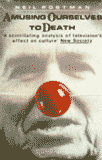

|
Public discourse in the age of show business Neil Postman Fine anti-TV polemic from the sadly deceased Postman, tracing the cultural impact of electronic communication from the invention of the telegraph to the advent of multi-channel Television. For Postman, a thinker who has managed to 're-discover' Marshal McLuhan's work and demonstrate and expand on some of the important ideas hidden amongst the confusion of his many ramblings. This work draws on McLuhan's famous maxim, "the medium is the message" - the method you use to communicate a message has as much impact as the message's contents. In an accessible, intelligent, dry and sometimes humourous style, he charts the broad history of human culture in relation to the dominant media of the time. He notes how culture shifted from a spoken one where convincing oratory, symbolism and emotive stories were most influential, to a written one, where words and arguments had to be more rational and carefully constructed, as they were permanent and available for scrutiny and review. Looking at the effects of TV on politics and the multi-billion dollar Televangical movement, he argues that TV is now pushing us back into a spoken culture - an explanation for the ever increasing amount of spin, 'presentation' and image control used to keep the powerful in power. Postman sadly died in 2003 but his work is being carried on by the likes of whitedot.org, organisers of "Turn Off TV" week and general all round ranters against the box. They also supply "TV-B-Gone" zappers, designed to switch off any TV. Highly interesting (and amusing read) - not too long or dense in language. Heartily recommended. "I raise no objections to televisions junk.
The best things on television are its junk, and no-one and nothing
is threatened by it...television is at its most trivial and dangerous
when its aspirations are high, when it presents itself as a carrier
of important cultural conversations. The irony here is that this
is what intellectuals and critics are constantly urging television
to do" |
|
SchNEWS, PO Box 2600, Brighton, BN2 0EF, England Phone +44 (0)1273 685913 email: schnews@brighton.co.uk @nti copyright - information for action - copy and distribute |
|
 AMUSING
OURSELVES TO DEATH
AMUSING
OURSELVES TO DEATH